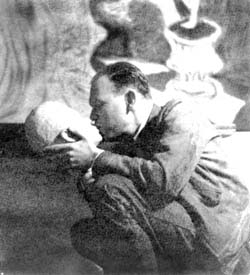Monday, October 20, 2014
"The glint of a dead writer's bones"
Christopher Nealon's essay "Affect, performativity, and actually existing poetry" looks at the intellectual histories of the terms "affect" and "performativity" and neatly traces two narratives of their use by the academy: the first in queer theory of the early 1990's and the second sprinkled throughout post-war French thought but located chiefly around the emergence of post-structuralism in the 1960's and 70's.
I think that some important subtext for this argument has been largely left out. Seeking to bifurcate a European-centered theory of the performative based on language and a US-centered theory based on rhetoric, Nealon criticizes the arc of theory that brought about the linguistic turn in French philosophy. In doing so, he eschews the political context. The very theorists who were key actors in fashioning the now-dominant narrative of post-structuralist criticism in French theory were public intellectual and political figures who had become disenchanted to say the least with communist parties in Europe. For one example, look no further than the violence and repression of Autonomia Operaismo (an Italian autonomist worker's movement) and student protesters by Italian Communist Party (PCI).* This crackdown was denounced by many, including Foucault, Deleuze, Guattari, Sartre, and Julia Kristeva. Kristeva's “anti-dialecticism” in Revolution in Poetic Language appears to Nealon, among others, as a red herring that typifies the errors of the linguistic turn. (Nealon, 268)
I'm not saying that Nealon is wrong in his project: in fact, I find his argument very convincing because he grounds theory in the political necessity of its development in a given time and place. For example, his reading of queer theory and the work of Judith Butler and Eve Kosofsky Sedgewick foregrounds the political necessity of theory to provide counter narratives to scientific discourses about sexuality and identity in the US, or what Nealon calls a “riposte...to the becoming-scientific of American psychoanalysis.” (263) His critique of French literary theory's dominant status in the US seems to beg the opposite question. Why would theories fashioned of the necessity to move beyond party communism in Europe become a touchstone for intellectual thought in the US? What is this saying about “actual poetry” in America?
In accordance with this argument, it seems to me that Nealon also has a political purpose for putting his theory forward, similarly rooted in time and place. Enter Jack Spicer, whose recent revival presents Nealon with an opportunity “to tell stories about poetry and politics other than the affective-performative one,” using rhetorical analysis to bring the figure of the author and their politics (a kind of literary Leninism?) to the fore. (263)
For me, the most striking “story” that Nealon provides comes from Spicer's unnamed “JFK poem,” which appears in Language. Here Spicer merges two histories, the Alaskan earthquake in 1964 with the assassination of JFK, and surprises the reader with the “performance” of the poem, intertwining the two events in a way that they can't easily be disentangled for a light-hearted effect. For Nealon, this technique provides a flash of meaning, but one which cannot be separated from the whole and resists commodification. In the rhetoric of the poem a debate is raging, but unlike the French literature, Nealon tell us, “the poems are not an argument with philosophy,” a subtle but important point. (278) The presence of the author, too, might be faintly perceived “like the glint of a dead writer's bones in a ton of concrete,” but there is no way to separate the author from the language in the poem, which he is entombed in, forever. (278)
Reading Nealon's essay has been a great generative exercise, causing a number of questions and ideas to bubble up to the surface regarding "Bartleby the Scrivener." Some are questions that linger from last week: how does a writer's political context shape their work? How much of a part does geography play in shaping this context? Can we read Melville's fiction (as Nealon argues of Spicer's poetry) as less of an object than a relation or social context? What are the personal debates that can be viewed through the rhetoric of "Bartleby"? It might be obvious how language invites commodification, but is there also resistance taking place? It seems as though there is an opportunity, given the revival of "Bartleby" as both a slogan and as an archetype of resistance, to tell a story of rhetoric vs. language, and indeed, some critics already have. **
* See Franco “Bifo” Berardi's account of the crackdown on Operaismo and students in Precarious Rhapsody, especially his mention of French intellectuals and their response to PCI repression on page 27.
** See The Static Hero in American Literature and Culture: Social Movements.
Subscribe to:
Post Comments (Atom)

Re: Nealon on Spicer and poetry as social relation rather than object -- what are the benefits and pitfalls of reading refusal and recalcitrance (which can exist on a spectrum from Bartleby to the "Dirty Jack" of Persky's dream) as resistance?
ReplyDelete